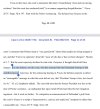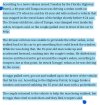If the mentioned real estate "insiders" are bewildered, it's their own damn fault. The judge's order is clear. If they insist on misunderstanding it, there is nothing you nor I can do to help them.
The Trump Card...
- Thread starter muttly
- Start date
It's Bad and Getting Worse for Trump
A year ago, Trump had not been indicted even once. Now he's been indicted and arraigned on felony criminal charges in four courts. He is charged with 90+ felonies in these four indictments. A conviction on just one of them can put him in jail for the rest of his life.
Yesterday's ruling in a major civil fraud lawsuit means that all of Trump's New York businesses are going to be stripped away from him and placed in the hands of receivers to be dissolved. Additional sanctions and damages (prosecutors seek $250 million) are likely to come out of the related trial that begins Monday.
Already declared to be a rapist by the judge in the E Gene Carroll trial, Trump will soon return to that court to learn how many additional millions he must pay in damages for his additional defamatory acts.
But the Republicans still love him! When you have the love of enough Republican primary voters to win the Republican nomination, what more do you need?
A year ago, Trump had not been indicted even once. Now he's been indicted and arraigned on felony criminal charges in four courts. He is charged with 90+ felonies in these four indictments. A conviction on just one of them can put him in jail for the rest of his life.
Yesterday's ruling in a major civil fraud lawsuit means that all of Trump's New York businesses are going to be stripped away from him and placed in the hands of receivers to be dissolved. Additional sanctions and damages (prosecutors seek $250 million) are likely to come out of the related trial that begins Monday.
Already declared to be a rapist by the judge in the E Gene Carroll trial, Trump will soon return to that court to learn how many additional millions he must pay in damages for his additional defamatory acts.
But the Republicans still love him! When you have the love of enough Republican primary voters to win the Republican nomination, what more do you need?

Bolt Express Commercial
1-888-234-5822
Advertiser
BOLT EXPRESS TRUCKLOAD LOOKING FORQUALIFIED CLASS A COMPANY DRIVERS APPLY NOW!Benefits Include:1.Solo Drivers average 2,800-3,200 Steady Miles Per. Week2.$0.40 All Mile3.OTR & Regional Positions Available4.Flexible Home Time5.On-Site Fueling6.Paid Vacation7.Referral Bonus8. 100% lumper fees paid POSITIONS ARE ... Apply Today!
RLENT
Veteran Expediter
It's Bad and Getting Worse for Trump
A year ago, Trump had not been indicted even once. Now he's been indicted and arraigned on felony criminal charges in four courts. He is charged with 90+ felonies in these four indictments. A conviction on just one of them can put him in jail for the rest of his life.
Yesterday's ruling in a major civil fraud lawsuit means that all of Trump's New York businesses are going to be stripped away from him and placed in the hands of receivers to be dissolved. Additional sanctions and damages (prosecutors seek $250 million) are likely to come out of the related trial that begins Monday.
Already declared to be a rapist by the judge in the E Gene Carroll trial, Trump will soon return to that court to learn how many additional millions he must pay in damages for his additional defamatory acts.
But the Republicans still love him! When you have the love of enough Republican primary voters to win the Republican nomination, what more do you need?
... a Get Out of Jail Free Card ?
Independents love him too. Like 15 points better than Biden, who is cratering in the polls.
As Expected, Judge Chutkan Will Not Recuse
The trial is scheduled to begin March 4, 2024

 news.yahoo.com
news.yahoo.com
The trial is scheduled to begin March 4, 2024
Judge Chutkan denies Trump’s request to recuse herself in federal election subversion case
U.S. District Judge Tanya Chutkan said Wednesday she won’t recuse herself from Donald Trump’s 2020 election interference case in Washington, rejecting the former president’s claims that her past comments raise doubts about whether she can be fair. Chutkan, who was nominated to the bench by...
I cant believe how many people fell for the whole "judge says Mar a Largo is only worth 18M"
They're grasping at straws.I cant believe how many people fell for the whole "judge says Mar a Largo is only worth 18M"
You do this again and again. A court makes a ruling you don't like. You respond by posting case arguments that were laughed out of court, thrown out of court, or denied by the court. You act as if the case has never been argued before, and that what you post will somehow make a difference in the ruling the court has already made.
Are you saying the ONE PERSON wasn't in reference to Trump? Try to be honest.You do this again and again. A court makes a ruling you don't like. You respond by posting case arguments that were laughed out of court, thrown out of court, or denied by the court. You act as if the case has never been argued before, and that what you post will somehow make a difference in the ruling the court has already made.
RLENT
Veteran Expediter
Are you saying the ONE PERSON wasn't in reference to Trump?
Doesn't really matter whether it was or wasn't.
The judge was responding to several defendants before her, addressing an issue that the defendants had raised.
She noted a matter of fact ... and didn't opine on it any further.
Try to be honest.
Is this part of some new comedy bit you're considering adding to your routine ?
I don't understand your question.Are you saying the ONE PERSON wasn't in reference to Trump? Try to be honest.
Additional Info About Trump's Businesses
"Two of the companies named in the order, DJT Holdings LLC and DJT Holdings Managing Member LLC, 'sit at the top of the Trump Organization's organizational chart and together own many of the Trump-affiliated entities that comprise the Trump Organization,' the judge noted in his 35-page ruling.
"The Trump Organization is the umbrella company comprising hundreds of companies owned by the former president, and under the order, a receiver would sell off its assets.
"'The only thing that would stand in the way of that would be an order from the appellate division staying this order until there's an appeal,' Epner told The Messenger." (Source)
"Two of the companies named in the order, DJT Holdings LLC and DJT Holdings Managing Member LLC, 'sit at the top of the Trump Organization's organizational chart and together own many of the Trump-affiliated entities that comprise the Trump Organization,' the judge noted in his 35-page ruling.
"The Trump Organization is the umbrella company comprising hundreds of companies owned by the former president, and under the order, a receiver would sell off its assets.
"'The only thing that would stand in the way of that would be an order from the appellate division staying this order until there's an appeal,' Epner told The Messenger." (Source)
RLENT
Veteran Expediter
I don't understand your question.
He's asking if you disputed that the reference to "one person who" (highlighted in the previous screenshot he posted) was a reference to Trump.
That's a (partial) quote of a comment Judge Chutkin made in a sentencing hearing for a Jan 6th'er ... that Trump's defense cited in their recusal motion.
Apparently Muttly thinks it's ... a really big deal ... presumably because the defense cited it in their motion.
It's not at all a big deal ... as the Judge explained today in her denial of Trump's motion to recuse.
Judge Changes 10 Days to 30 Days
CNN: "Addressing the uncertainty from Trump on when a court-appointed manager, known as a receiver, would oversee the dissolution of Trump’s corporate entities, [Judge] Engoron extended the timeline to 30 days to come up with a plan for the receivership, up from the original 10.
"The trial, despite Tuesday’s ruling which addressed part of James’ claims, will still proceed on Monday as scheduled, the judge said." (Source)
Noteworthy Item: Notice the language "... when a court-appointed manager, known as a receiver, would oversee the dissolution of Trump's corporate entities, ..."
No one is talking about IF this will happen. Even Trump's attorney's are speaking in terms of WHEN this will happen.
Trump has one chance to avoid this. That would be a successful appeal of Judge Engoron's ruling. The appeal will certainly be made. Trump's attorney's have said that. Will it succeed? I going to go out on a limb and say no.
Trump's track record with court rulings and appeals is abysmal. Since the November, 2000 election, Trump has won only six of the 127 court actions involving him. In other words, when Trump is in court, he loses over 95% of the time.
CNN: "Addressing the uncertainty from Trump on when a court-appointed manager, known as a receiver, would oversee the dissolution of Trump’s corporate entities, [Judge] Engoron extended the timeline to 30 days to come up with a plan for the receivership, up from the original 10.
"The trial, despite Tuesday’s ruling which addressed part of James’ claims, will still proceed on Monday as scheduled, the judge said." (Source)
Noteworthy Item: Notice the language "... when a court-appointed manager, known as a receiver, would oversee the dissolution of Trump's corporate entities, ..."
No one is talking about IF this will happen. Even Trump's attorney's are speaking in terms of WHEN this will happen.
Trump has one chance to avoid this. That would be a successful appeal of Judge Engoron's ruling. The appeal will certainly be made. Trump's attorney's have said that. Will it succeed? I going to go out on a limb and say no.
Trump's track record with court rulings and appeals is abysmal. Since the November, 2000 election, Trump has won only six of the 127 court actions involving him. In other words, when Trump is in court, he loses over 95% of the time.
Last edited:
Well said. I have nothing to add.He's asking if you disputed that the reference to "one person who" (highlighted in the previous screenshot he posted) was a reference to Trump.
That's a (partial) quote of a comment Judge Chutkin made in a sentencing hearing for a Jan 6th'er ... that Trump's defense cited in their recusal motion.
Apparently Muttly thinks it's ... a really big deal ... presumably because the defense cited it in their motion.
It's not at all a big deal ... as the Judge explained today in her denial of Trump's motion to recuse.
Last edited:
RLENT
Veteran Expediter
What defies belief is that some rando Twitter guy from Texas would comment about the matter ... apparently without understanding the first thing about the requirements on judges for recusal ...
That some in the MAGA crowd would buy into it doesn't (defy belief) however.
She's allowed to have opinions on those uncharged for Jan 6th. Even about El Donaldo.
What she isn't allowed to do is to allow those opinions to in any way effect her rulings on the law in the case, it's administration, and rendering justice.
IOW, she's obliged to uphold the law and render a just verdict and accompanying sentence ... irregardless of her personal opinions.
As part of becoming a judge she took an oath to disregard her personal opinions on social, political, and legal issues and scrupulously follow the law.
That's what judges should do:
Supreme Court Justice Antonin Scalia’s vote in Texas v. Johnson (1989) vividly demonstrates the commitment of judges to set aside individual preferences and adhere to the law. In Johnson, the court considered the constitutionality of a Texas statute that criminalized the burning of the American flag. Justice Scalia’s personal opinion on the issue was well known.
He made no bones about telling a reporter that he disliked people who burn the flag, and if king, he would jail all flag burners (Barnes, 2008). Disregarding his personal conviction that flag burning should be a crime, Justice Scalia voted with the majority to reverse Johnson’s conviction for the very conduct Scalia found so abhorrent. And Justice Scalia was not alone in placing the law above personal preferences. Justice Anthony Kennedy concurred in the majority opinion in Johnson even though the case outcome was “painful” to him.
"The hard fact is that sometimes we must make decisions we do not like. We make them because they are right, right in the sense that the law and the Constitution, as we see them, compel the result. And so great is our commitment to the process that, except in the rare case, we do not pause to express distaste for the result, perhaps for fear of undermining a valued principle that dictates the decision. This is one of those rare cases" (Texas v. Johnson, 1989: 420-21).
When the Law and a Judge’s Personal Opinions Collide

Ascent Expedite
414-615-1556
Advertiser
Our Class A CDL Teams Earn Up to $40000.00 per MonthLate model Petes - Cummins or Paccar, Automatic, APU, low miles Paid Fuel SurchargeEarn up to $2.00+ per mileAll Miles PaidPaid Assessorial• MUST HAVE 2 YEARs CDL A DRIVING EXPERIENCE• VALID CLASS A CDL• DOT MEDICAL CARD• PASS A DRUG TEST – ... Apply Today!










